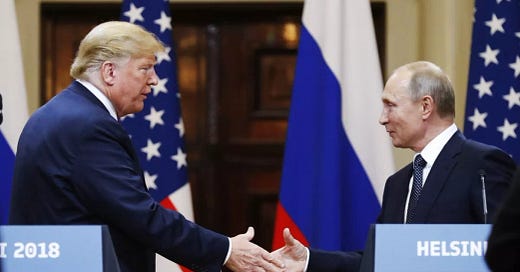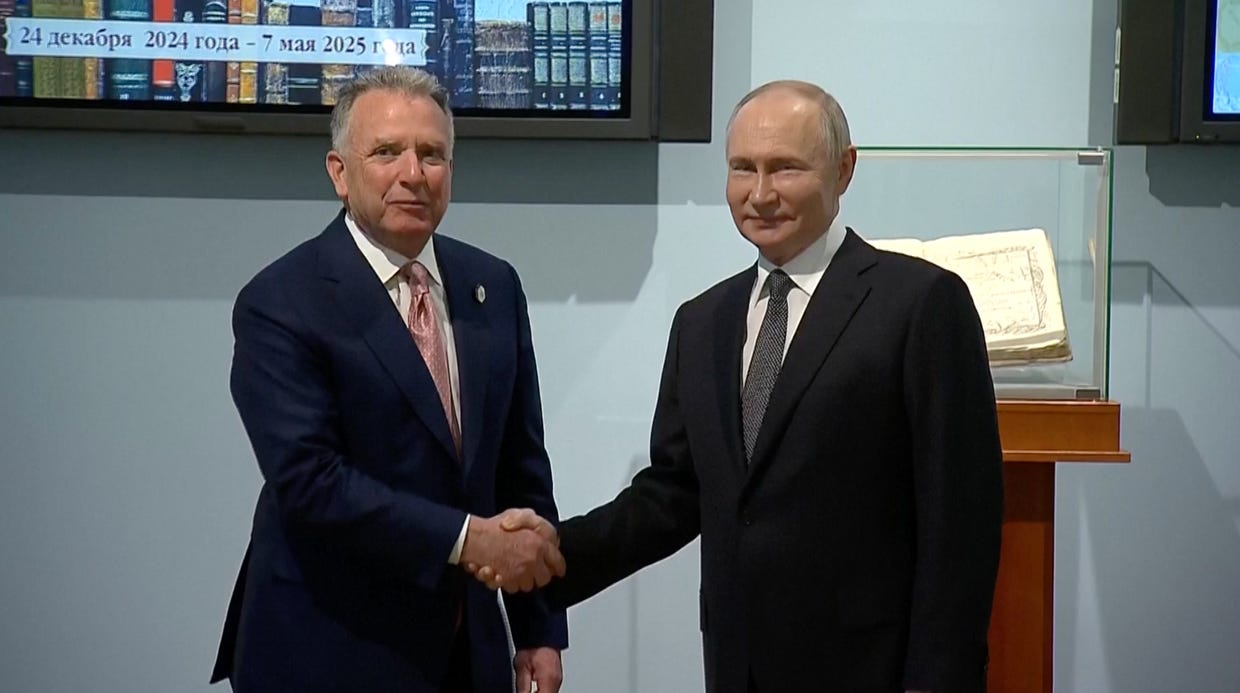Russia, as the Easter truce confirmed once again, is steering the nascent U.S.-Russian dialog in the direction it wants. The very organization of such a dialogue confirms that Moscow intends to use it to achieve its goals, without antagonizing Washington - that is, without openly demanding concessions, but rather trying to demonstrate accommodation, willingness to follow Donald Trump's agenda, emphasizing the convergence of fundamental views on what is happening in the world, and thus maintaining the American leader's favorable attitude toward the Kremlin's political course for as long as possible.
This is achieved, among other things, with the help of various rhetorical exercises, a vivid example of which are Putin's statements that the 2020 elections were “stolen” from Trump, or that Russia and the United States are peacekeepers, while the war in Ukraine is supported solely by Europe.
Or through the clumsy tweets of Russia's new “negotiator” Kirill Dmitriev, who is trying his best to suck up to Trump by admiring his “insight” and determination for peace and condemning any protests and criticism of Trump in American society and beyond. Dmitriev even managed to find traces of the work of the “deep state” in the US in organizing the recent large-scale protests. Indeed, Trump was right that some are so eager to kiss him in a certain place.
However, flattery alone will not get you very far - and Russian diplomats understand this very well. It must be recognized that Russian diplomacy is very consistent and effective. It constantly exploits the blunders and shortcomings of Western politicians, and in many cases it achieves its goals better than Western diplomats and negotiators. But that is a topic for a separate discussion.
Multichannel approach
The Russia-U.S. dialog began with a telephone conversation between the presidents, followed by a meeting in Riyadh between U.S. Secretary of State Marco Rubio and Russian Foreign Minister Sergei Lavrov in the company of Putin's foreign policy aide Yuri Ushakov. The two sides agreed to begin restoring diplomatic relations, including reopening embassies to pre-war conditions and creating working groups on various regulatory issues - including the Ukrainian question.
Now the conversation is being conducted simultaneously on several tracks. This is an official dialog of foreign policy agencies - the Russian Foreign Ministry and the U.S. State Department. It is also diplomatic contacts at a lower level, concerning the subtleties of diplomatic activity. They are supported, for example, by the Russian ambassador to the United States, Alexander Darchiev, and the head of the State Department's Bureau of European and Eurasian Affairs, Sonata Coulter.
There is a separate track where security issues are discussed, including strikes on energy facilities and military action in the Black Sea. The Russian side is represented by persons with a status not very clear for negotiations - experienced diplomat and now Senator Grigory Karasin and former head of the FSB Fifth Service Sergei Beseda (whose over-optimistic and not corresponding to reality reports on the state of affairs in Ukraine largely contributed to Putin's decision to start a war in the expectation of a quick and easy victory).
Let's add to this the “economic” dialog along the lines of Steve Witkoff - Kirill Dmitriev. It concerns prospects for business cooperation: Dmitriev promises the Americans access to promising projects in Russia - in the mining of rare-earth elements, oil in the Arctic, and so on. This contradicts the propaganda rhetoric about fighting the West, which is eager to seize Russian resources, but no one in the Kremlin seems to be embarrassed by it.
(By the way, this is yet another confirmation that Putin and his entourage have no ideology, no “Putinism” and no strategic vision. The only goal is to retain power, which means that any threat of US and European interference in the internal affairs of the Russian Federation must be eliminated, which should be achieved by changing the status quo in international relations through the seizure of Ukraine and the drawing of new de facto borders between the spheres of influence of the great powers).
In addition to the channels described above, there are unofficial channels, for example, through the Geneva Center for Security Policy (the Swiss are desperately trying to preserve their status as an international mediator at least in effigy), which holds periodic informal and unofficial expert meetings and discussions. Contacts between intelligence agencies are maintained; for example, discussions on prisoner exchanges are usually held between intelligence agencies.
This multichannel approach allows Moscow to control the development of the dialog with the United States and, if necessary, to slow it down if the Americans start behaving more insistently and demand reciprocal steps - let's not forget that despite Trump's many favorable statements to Russia during his presidency and some concessions (temporary suspension of military aid to Ukraine, refusal of NATO membership), there have been no radical changes in American policy in Russia's favor.
Old diplomatic tricks
At the same time, questions arise. For example, to what extent does Dmitriev coordinate his diplomatic efforts with the Foreign Ministry? Does Sergei Lavrov approve the talking points for Dmitriev's conversations with American representatives? Or does Dmitriev get his instructions directly from Putin? According to the logic of relations within the government, Dmitriev should try to demonstrate his independence from Lavrov - so his status as an important and influential negotiator will be strengthened, and with it his position in the echelons of power and prospects for the future. This, in turn, may lead to friction with the Foreign Ministry (some rumors about this have already been leaked to the media) and to contradictory statements that various Russian representatives will make to their overseas partners. The absence of the figure of the Chief Negotiator - that is, the person responsible for the success of the negotiations as a whole - also does not contribute to the effectiveness of diplomacy. If, say, Dmitriev says one thing and Lavrov says something slightly different, who are we to believe? Who is authorized to decide whose position is closer to the truth? To whom will the Americans have to turn for clarification? To Putin every time?
Today, however, the pros of this approach seem to outweigh the cons in Moscow's eyes.
If, say, the bravura fanfare of Witkoff-Dmitriev fades due to lack of progress, it will be possible to imitate the continuation of dialog through other channels. Multichannelization allows Moscow to “play” the negotiations like a musical instrument - amplifying or weakening the sound depending on the U.S. reaction.
In addition, it is possible to slow down or stop the conversation altogether, referring to the need for “additional work” on some problematic issue that arose on one of the tracks. You need time to scrutinize and consider everything, so the rest of the communication channels will have to wait. You can't move forward and leave unclarified issues behind, can you? That would be counterproductive, Russian diplomats would say.
Such a game of undertones and accents is an old diplomatic tactic that the West seems to have long since forgotten. All these stunts are taken seriously there, with heightened anxiety. In reality, they are maneuvers to buy time and wait for the U.S. support for Ukraine to weaken, ideally to simulate a dialogue until the administration in Washington, under the pressure of domestic problems, will either be forced to make the desired concessions to Moscow to get rid of the Russia-Ukraine issue, or will simply step aside, shifting the focus of attention to something more promising from their point of view.
The negotiations do not appear to be going easily. The greatest progress, judging by the statements, may be made on the Dmitriev-Witkoff track - perhaps because of Witkoff's desire to please Trump at any cost and conclude the notorious “deal” as quickly as possible, he tends to literally broadcast the Russian point of view and advocate full acceptance of Putin's terms. This approach clearly seems much more promising to the experienced businessman in order to obtain immediate “success” in the form of a certain “peace agreement”. And where will it all lead to in the near future - well, why think about it? The “deal” itself is the answer to all questions.
In reality, there is no real progress even on the issue of resuming the work of diplomatic missions - except for partial solutions on banking services.
This, by the way, is not such an insignificant issue: embassies are complex structures, and without normal banking services their work is severely hampered. Utility and repair services, purchases of necessary goods for work, payment for communication services, internet, etc. - all this often requires free access to banking services without any restrictions. And even in such a technical matter, the United States is extremely reluctant to make concessions.
As for Moscow, apart from the heated rhetoric, in fact it has not made any concessions at all. Putin's statement about supporting the truce for 30 days turned out to be empty words - the shelling of Ukraine has not stopped, and strikes are being carried out on civilian infrastructure and civilians. The extension of the “Easter truce” was approved by Ukrainian President Volodymyr Zelensky - but not by Vladimir Putin, who suddenly announced it explicitly in response to Trump's words about a deadline for Russia and a desire for progress in negotiations.
Although it is quite obvious that the activity started by Donald Trump to “reconcile” Russia and Ukraine as it is being carried out is not capable of bringing about a fundamental change in the situation and an end to the war.
The main means of achieving the goals set by Vladimir Putin remains the continuation of military actions. They can be stopped either by serious and unambiguous pressure from the U.S. and other Western countries, including the notorious “escalation,” or by a weighty “black swan” in the form of sudden and dangerous for the regime economic and social perturbations in Russia.
Or U.S. capitulation to Putin's “legitimate demands,” as advocated by newly minted diplomat Steven Witkoff.





